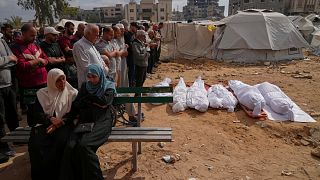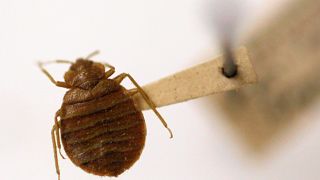Africa famine
Paska Itwari Beda knows hunger all too well. The young mother of five children, all of them under the age of 10, sometimes survives on one bowl of porridge a day.
Her entire family is lucky to scrape together a single daily meal. Even with much of the money Beda makes cleaning offices going toward food.
She goes to bed hungry in hopes that her children won't have to work or beg like many others in South Sudan. A country only a decade old and already devastated by civil war.
But the pandemic scares Beda in ways that even hunger doesn't.
"Before coronavirus, life was good. A hundred (South Sudanese) pounds (about 0.8 cents) could get you something but now coronavirus is here, you cannot do anything with that hundred. Now you go with one thousand pounds ($8 dollars) to the market or one thousand-and five-hundred, it won't get you anything at all, that's how virus has affected us. Also it ruined (the lives of) many children, some are forcefully married, others are involved in stealing and have become thieves and some have become street children. Without school, they are lost", Beda said.
As a cleaner, she makes 16,000 South Sudanese pounds a month ($123).
Beda earns additional money by making cupcakes to sell in her office building. But the money doesn't buy much.
The family's water deliveries dried up with their savings. So, with the help of her children, Beda now hauls water herself. They walk to the well several times a week, where she heaves a plastic container onto her head.
Beda tries to keep it steady, though stray rivulets run down her neck, past small metal earrings that say "Jesus."
She constantly watches her children for any sign of illness. Medical care was easier before coronavirus. Medicines once available at the government hospital are hard to find now. And hospital services are no longer free because of the pandemic's economic toll.
When the children fall ill, Beda might choose to save money and rely on herbal remedies alone.
But recently one of the twins came down with a cough and fever, serious enough for a hospital visit. She received medicine, but Beda hasn't been able to take her back for follow-up care.
Heart wrenching stories like that of Beda forced a women's group to pull their widow's mite to ameliorate their plight.
"We became jobless because most of the places we were working at before closed down. Everybody was saying 'corona' or 'lockdown' and we stayed home, nothing to help ourselves with. We thought of initiating the society. So, we can collect contributions of soap. If we are ten, each one of us will give one bar of soap. We collected them in one of our sister's homes. And if we hand out ten (bars of) soap, it will help in laundry and washing babies, because you cannot buy soap of your own, because there is no money, and it is not enough. And because, with the pandemic, there is no money’’, Margaret Peter, 28, chairwoman of women's group and mother of five children said.
South Sudan's local health centers were not prepared to deal with an outbreak like Covid-19. Infections are rising in the country as countries across Africa grapple with a wave of cases.
Overall, the country has had over 10,000 confirmed coronavirus cases, but that number is likely an undercount because of a lack of testing. Oxygen, ICU beds and other critical supplies are scarce, even in the capital.
South Sudan has received a fraction of the vaccines it needs. Only 60,000 doses so far, according to the Africa Centers for Disease Control and Prevention.













01:02
WHO member countries draft landmark preparedness treaty for next pandemic
Go to video
Mauritius: Ex-finance minister released on bail after corruption charges
04:10
UN warns of worsening famine in Sudan as fighting escalates
01:02
The US prepares to announce sanctions against Sudan's army chief
01:20
A look back on five years of Covid-19
02:09
Residents in Sudan grapple with effects of climate change as well as conflict